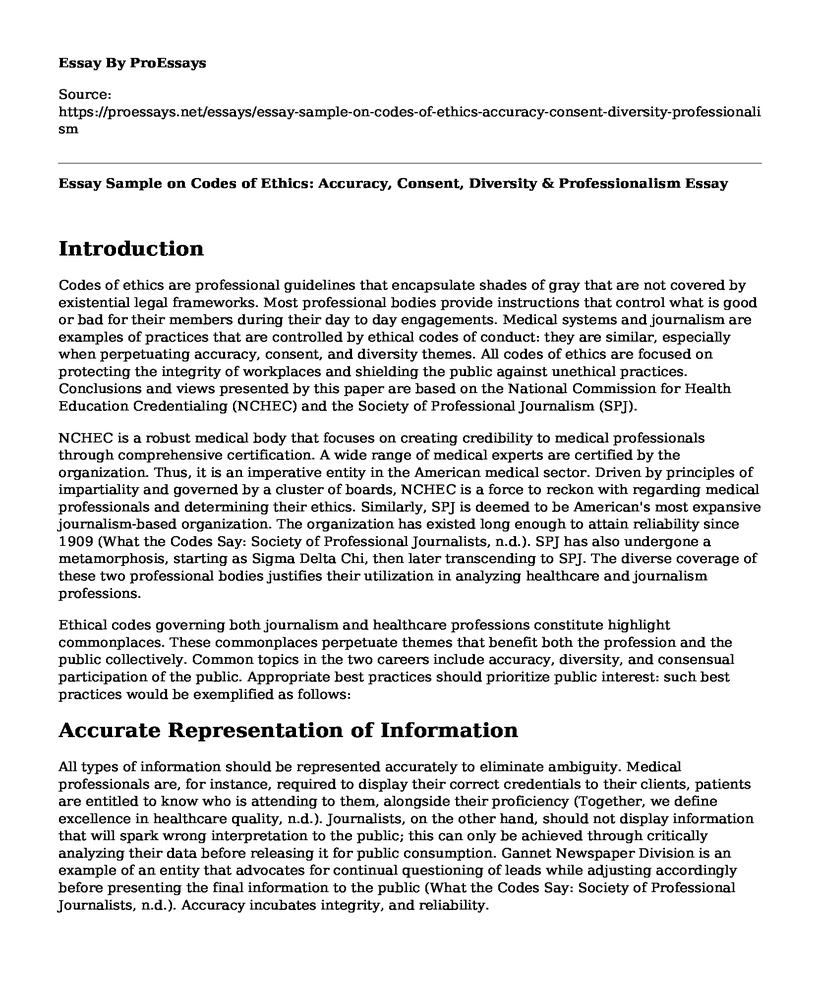Introduction
Codes of ethics are professional guidelines that encapsulate shades of gray that are not covered by existential legal frameworks. Most professional bodies provide instructions that control what is good or bad for their members during their day to day engagements. Medical systems and journalism are examples of practices that are controlled by ethical codes of conduct: they are similar, especially when perpetuating accuracy, consent, and diversity themes. All codes of ethics are focused on protecting the integrity of workplaces and shielding the public against unethical practices. Conclusions and views presented by this paper are based on the National Commission for Health Education Credentialing (NCHEC) and the Society of Professional Journalism (SPJ).
NCHEC is a robust medical body that focuses on creating credibility to medical professionals through comprehensive certification. A wide range of medical experts are certified by the organization. Thus, it is an imperative entity in the American medical sector. Driven by principles of impartiality and governed by a cluster of boards, NCHEC is a force to reckon with regarding medical professionals and determining their ethics. Similarly, SPJ is deemed to be American's most expansive journalism-based organization. The organization has existed long enough to attain reliability since 1909 (What the Codes Say: Society of Professional Journalists, n.d.). SPJ has also undergone a metamorphosis, starting as Sigma Delta Chi, then later transcending to SPJ. The diverse coverage of these two professional bodies justifies their utilization in analyzing healthcare and journalism professions.
Ethical codes governing both journalism and healthcare professions constitute highlight commonplaces. These commonplaces perpetuate themes that benefit both the profession and the public collectively. Common topics in the two careers include accuracy, diversity, and consensual participation of the public. Appropriate best practices should prioritize public interest: such best practices would be exemplified as follows:
Accurate Representation of Information
All types of information should be represented accurately to eliminate ambiguity. Medical professionals are, for instance, required to display their correct credentials to their clients, patients are entitled to know who is attending to them, alongside their proficiency (Together, we define excellence in healthcare quality, n.d.). Journalists, on the other hand, should not display information that will spark wrong interpretation to the public; this can only be achieved through critically analyzing their data before releasing it for public consumption. Gannet Newspaper Division is an example of an entity that advocates for continual questioning of leads while adjusting accordingly before presenting the final information to the public (What the Codes Say: Society of Professional Journalists, n.d.). Accuracy incubates integrity, and reliability.
Diversity
Diversity is a premise that leads to the generation of reliable information. Instead of relying on a single source of information, professional bodies should form a concoction of information. Journalists are recommended to accumulate authentic information from a myriad of sources before making conclusions on a lead. Similarly, medics are required to apply knowledge from multiple sources when administering health solutions to their clients. Diversity is a key factor towards achieving authenticity.
Consensual Participation
Members of the public participating in journalists and healthcare endeavors should do so devoid of compulsion. Consent is essential for the two professions because they both converge on the aspect of human rights that are entrenched in legal frameworks. Research and evaluation principles also dictate consideration of voluntary participation when conducting research activities.
Conclusion
In conclusion, ethical codes are imperative in preventing professionals from going overboard in their day to day activities. NCHEC and SPJ are such organizations that provide decency in the healthcare and journalism professional, respectively. The critical guidelines required to control the two professionals should be based on rules of accuracy, diversity, and voluntary participation of the public.
References
Together we define excellence in healthcare quality. (n.d.). Retrieved April 13, 2020, from https://nahq.org/wp-content/uploads/attachments/NAHQ_Histories_Current.pdf
What the Codes Say: Society of professional journalists. (n.d.). Www.Spj.Org. Retrieved April 13, 2020, from https://www.spj.org/ethicscode-provisions.asp#6
Cite this page
Essay Sample on Codes of Ethics: Accuracy, Consent, Diversity & Professionalism. (2023, May 22). Retrieved from https://proessays.net/essays/essay-sample-on-codes-of-ethics-accuracy-consent-diversity-professionalism
If you are the original author of this essay and no longer wish to have it published on the ProEssays website, please click below to request its removal:
- State of Consciousness Essay Example
- Free Will Is an Illusion Essay Example
- Man's Nature Is Good: Annotated Bibliography
- Essay Sample on Socrates' Defiance: Plato's The Apology
- Essay Example on 2003 SARS Outbreak: How it Was Contained & Eradicated
- Evaluating Prospects of Baby Teresa's Organ Transplant via DCT & Utilitarianism - Essay Sample
- Essay Example on Relativism in Religion and Ethics: A Closer Look







